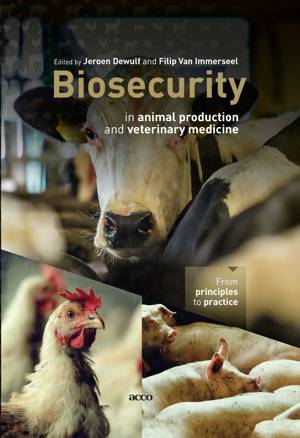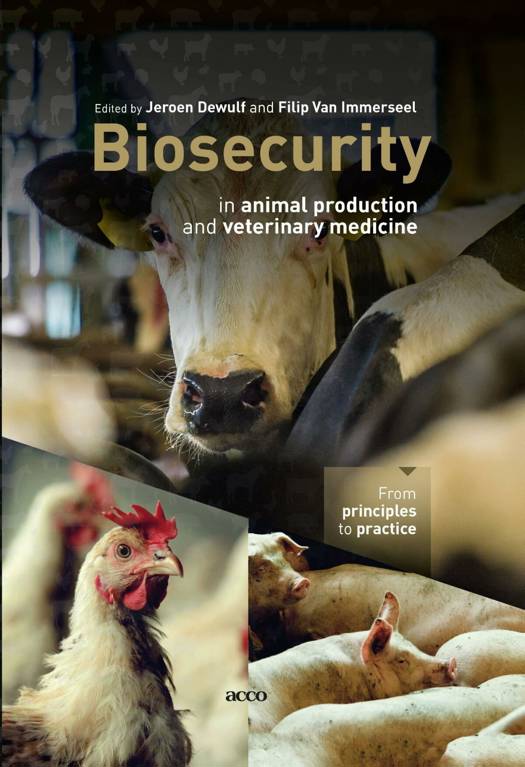
Door een staking bij bpost kan je online bestelling op dit moment iets langer onderweg zijn dan voorzien. Dringend iets nodig? Onze winkels ontvangen jou met open armen!
- Afhalen na 1 uur in een winkel met voorraad
- Gratis thuislevering in België vanaf € 30
- Ruim aanbod met 7 miljoen producten
Door een staking bij bpost kan je online bestelling op dit moment iets langer onderweg zijn dan voorzien. Dringend iets nodig? Onze winkels ontvangen jou met open armen!
- Afhalen na 1 uur in een winkel met voorraad
- Gratis thuislevering in België vanaf € 30
- Ruim aanbod met 7 miljoen producten
Zoeken
Biosecurity in animal production and veterinary medicine E-BOOK
From principles to practice
Jeroen Dewulf, Filip van Immerseel
E-book | Engels
€ 49,00
+ 49 punten
Uitvoering
Omschrijving
Globally, the way the animal production industry copes with infectious diseases is changing. The (excessive) use of antimicrobials is under debate and it is becoming standard practice to implement thorough biosecurity plans on farms to prevent the entry and spread of pathogenic micro-organisms. Not only in farm animal production, but also in facilities where companion animals are kept, including in veterinary practices and clinics, awareness of the beneficial implications of a good biosecurity plan has raised. The book Biosecurity in Animal Production and Veterinary Practices is the first compilation of both fundamental aspects of biosecurity practices, and specific and practical information on the application of the biosecurity measures in different animal production and animal housing settings.
The book starts with a general introductory chapter on the epidemiology of infectious diseases, followed by a chapter explaining the general principles of biosecurity. Specific topics of biosecurity, including rodent and insect control, cleaning and disinfection, hygiene and decontamination of feed, drinking water and air, and measuring the biosecurity status of farms, are detailed in dedicated chapters. Explanations on the relevance of the implementation of biosecurity plans in order to improve animal health and performance and reduce antimicrobial usage are described, and a chapter on ways to motivate farmers to implement a biosecurity plan has been included. Practical chapters deal with biosecurity in the poultry, pig, cattle and aquaculture industry, horse facilities, dog kennels, veterinary practices and clinics and laboratory animal facilities.
The book is a practical guide that can be used by farm and animal facility managers, consultants, veterinarians, animal caretakers, and people with an interest in prevention of diseases in animals. Academics and students will benefit from the book because it contains all relevant information on animal biosecurity.
The book starts with a general introductory chapter on the epidemiology of infectious diseases, followed by a chapter explaining the general principles of biosecurity. Specific topics of biosecurity, including rodent and insect control, cleaning and disinfection, hygiene and decontamination of feed, drinking water and air, and measuring the biosecurity status of farms, are detailed in dedicated chapters. Explanations on the relevance of the implementation of biosecurity plans in order to improve animal health and performance and reduce antimicrobial usage are described, and a chapter on ways to motivate farmers to implement a biosecurity plan has been included. Practical chapters deal with biosecurity in the poultry, pig, cattle and aquaculture industry, horse facilities, dog kennels, veterinary practices and clinics and laboratory animal facilities.
The book is a practical guide that can be used by farm and animal facility managers, consultants, veterinarians, animal caretakers, and people with an interest in prevention of diseases in animals. Academics and students will benefit from the book because it contains all relevant information on animal biosecurity.
Specificaties
Betrokkenen
- Auteur(s):
- Uitgeverij:
Inhoud
- Taal:
- Engels
Eigenschappen
- Productcode (EAN):
- 9789463448000
- Verschijningsdatum:
- 16/04/2018
- Uitvoering:
- E-book
- Beveiligd met:
- Digital watermarking
- Formaat:
- ePub

Alleen bij Standaard Boekhandel
+ 49 punten op je klantenkaart van Standaard Boekhandel
Beoordelingen
We publiceren alleen reviews die voldoen aan de voorwaarden voor reviews. Bekijk onze voorwaarden voor reviews.











